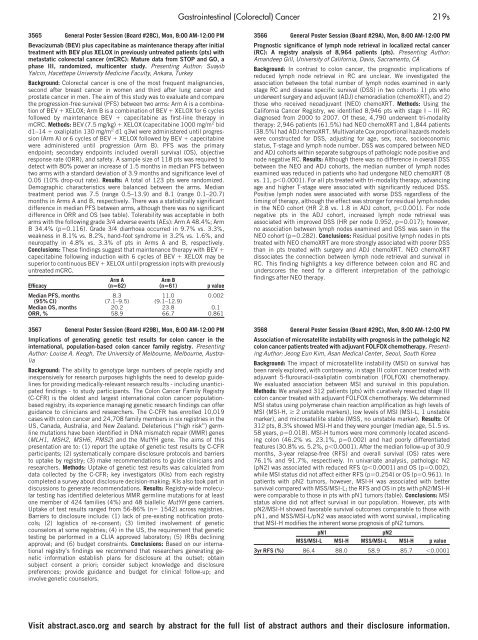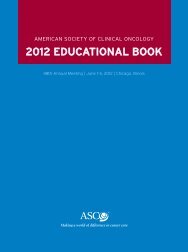Annual Meeting Proceedings Part 1 - American Society of Clinical ...
Annual Meeting Proceedings Part 1 - American Society of Clinical ...
Annual Meeting Proceedings Part 1 - American Society of Clinical ...
Create successful ePaper yourself
Turn your PDF publications into a flip-book with our unique Google optimized e-Paper software.
3565 General Poster Session (Board #28C), Mon, 8:00 AM-12:00 PM<br />
Bevacizumab (BEV) plus capecitabine as maintenance therapy after initial<br />
treatment with BEV plus XELOX in previously untreated patients (pts) with<br />
metastatic colorectal cancer (mCRC): Mature data from STOP and GO, a<br />
phase III, randomized, multicenter study. Presenting Author: Suayib<br />
Yalcin, Hacettepe University Medicine Faculty, Ankara, Turkey<br />
Background: Colorectal cancer is one <strong>of</strong> the most frequent malignancies,<br />
second after breast cancer in women and third after lung cancer and<br />
prostate cancer in men. The aim <strong>of</strong> this study was to evaluate and compare<br />
the progression-free survival (PFS) between two arms: Arm A is a combination<br />
<strong>of</strong> BEV � XELOX; Arm B is a combination <strong>of</strong> BEV � XELOX for 6 cycles<br />
followed by maintenance BEV � capecitabine as first-line therapy in<br />
mCRC. Methods: BEV (7.5 mg/kg) � XELOX (capecitabine 1000 mg/m2 bid<br />
d1–14 � oxaliplatin 130 mg/m2 d1 q3w) were administered until progression<br />
(Arm A) or 6 cycles <strong>of</strong> BEV � XELOX followed by BEV � capecitabine<br />
were administered until progression (Arm B). PFS was the primary<br />
endpoint; secondary endpoints included overall survival (OS), objective<br />
response rate (ORR), and safety. A sample size <strong>of</strong> 118 pts was required to<br />
detect with 80% power an increase <strong>of</strong> 1.5 months in median PFS between<br />
two arms with a standard deviation <strong>of</strong> 3.9 months and significance level <strong>of</strong><br />
0.05 (10% drop-out rate). Results: A total <strong>of</strong> 123 pts were randomized.<br />
Demographic characteristics were balanced between the arms. Median<br />
treatment period was 7.5 (range 0.5–13.9) and 8.1 (range 0.1–20.7)<br />
months in Arms A and B, respectively. There was a statistically significant<br />
difference in median PFS between arms, although there was no significant<br />
difference in ORR and OS (see table). Tolerability was acceptable in both<br />
arms with the following grade 3/4 adverse events (AEs): Arm A 48.4%; Arm<br />
B 34.4% (p�0.116). Grade 3/4 diarrhoea occurred in 9.7% vs. 3.3%,<br />
weakness in 8.1% vs. 8.2%, hand-foot syndrome in 3.2% vs. 1.6%, and<br />
neuropathy in 4.8% vs. 3.3% <strong>of</strong> pts in Arms A and B, respectively.<br />
Conclusions: These findings suggest that maintenance therapy with BEV �<br />
capecitabine following induction with 6 cycles <strong>of</strong> BEV � XELOX may be<br />
superior to continuous BEV � XELOX until progression inpts with previously<br />
untreated mCRC.<br />
Arm A<br />
(n�62)<br />
Arm B<br />
(n�61) p value<br />
Efficacy<br />
Median PFS, months<br />
8.3<br />
11.0<br />
0.002<br />
(95% CI)<br />
(7.1–9.5) (9.1–12.9)<br />
Median OS, months 20.2 23.8 0.1<br />
ORR, % 58.9 66.7 0.861<br />
3567 General Poster Session (Board #29B), Mon, 8:00 AM-12:00 PM<br />
Implications <strong>of</strong> generating genetic test results for colon cancer in the<br />
international, population-based colon cancer family registry. Presenting<br />
Author: Louise A. Keogh, The University <strong>of</strong> Melbourne, Melbourne, Australia<br />
Background: The ability to genotype large numbers <strong>of</strong> people rapidly and<br />
inexpensively for research purposes highlights the need to develop guidelines<br />
for providing medically-relevant research results - including unanticipated<br />
findings - to study participants. The Colon Cancer Family Registry<br />
(C-CFR) is the oldest and largest international colon cancer populationbased<br />
registry; its experience managing genetic research findings can <strong>of</strong>fer<br />
guidance to clinicians and researchers. The C-CFR has enrolled 10,019<br />
cases with colon cancer and 24,708 family members in six registries in the<br />
US, Canada, Australia, and New Zealand. Deleterious (“high risk”) germline<br />
mutations have been identified in DNA mismatch repair (MMR) genes<br />
(MLH1, MSH2, MSH6, PMS2) and the MutYH gene. The aims <strong>of</strong> this<br />
presentation are to: (1) report the uptake <strong>of</strong> genetic test results by C-CFR<br />
participants; (2) systematically compare disclosure protocols and barriers<br />
to uptake by registry; (3) make recommendations to guide clinicians and<br />
researchers. Methods: Uptake <strong>of</strong> genetic test results was calculated from<br />
data collected by the C-CFR; key investigators (KIs) from each registry<br />
completed a survey about disclosure decision-making; KIs also took part in<br />
discussions to generate recommendations. Results: Registry-wide molecular<br />
testing has identified deleterious MMR germline mutations for at least<br />
one member <strong>of</strong> 424 families (4%) and 48 biallelic MutYH gene carriers.<br />
Uptake <strong>of</strong> test results ranged from 56-86% (n� 1542) across registries.<br />
Barriers to disclosure include: (1) lack <strong>of</strong> pre-existing notification protocols;<br />
(2) logistics <strong>of</strong> re-consent; (3) limited involvement <strong>of</strong> genetic<br />
counselors at some registries; (4) in the US, the requirement that genetic<br />
testing be performed in a CLIA approved laboratory; (5) IRBs declining<br />
approval; and (6) budget constraints. Conclusions: Based on our international<br />
registry’s findings we recommend that researchers generating genetic<br />
information establish plans for disclosure at the outset; obtain<br />
subject consent a priori; consider subject knowledge and disclosure<br />
preferences; provide guidance and budget for clinical follow-up; and<br />
involve genetic counselors.<br />
Gastrointestinal (Colorectal) Cancer<br />
219s<br />
3566 General Poster Session (Board #29A), Mon, 8:00 AM-12:00 PM<br />
Prognostic significance <strong>of</strong> lymph node retrieval in localized rectal cancer<br />
(RC): A registry analysis <strong>of</strong> 8,964 patients (pts). Presenting Author:<br />
Amandeep Gill, University <strong>of</strong> California, Davis, Sacramento, CA<br />
Background: In contrast to colon cancer, the prognostic implications <strong>of</strong><br />
reduced lymph node retrieval in RC are unclear. We investigated the<br />
association between the total number <strong>of</strong> lymph nodes examined in early<br />
stage RC and disease specific survival (DSS) in two cohorts: 1) pts who<br />
underwent surgery and adjuvant (ADJ) chemoradiation (chemoXRT), and 2)<br />
those who received neoadjuvant (NEO) chemoXRT. Methods: Using the<br />
California Cancer Registry, we identified 8,946 pts with stage I – III RC<br />
diagnosed from 2000 to 2007. Of these, 4,790 underwent tri-modality<br />
therapy: 2,946 patients (61.5%) had NEO chemoXRT and 1,844 patients<br />
(38.5%) had ADJ chemoXRT. Multivariate Cox proportional hazards models<br />
were constructed for DSS, adjusting for age, sex, race, socioeconomic<br />
status, T-stage and lymph node number. DSS was compared between NEO<br />
and ADJ cohorts within separate subgroups <strong>of</strong> pathologic node positive and<br />
node negative RC. Results: Although there was no difference in overall DSS<br />
between the NEO and ADJ cohorts, the median number <strong>of</strong> lymph nodes<br />
examined was reduced in patients who had undergone NEO chemoXRT (8<br />
vs. 11, p�0.0001). For all pts treated with tri-modality therapy, advancing<br />
age and higher T-stage were associated with significantly reduced DSS.<br />
Positive lymph nodes were associated with worse DSS regardless <strong>of</strong> the<br />
timing <strong>of</strong> therapy, although the effect was stronger for residual lymph nodes<br />
in the NEO cohort (HR 2.8 vs. 1.8 in ADJ cohort, p�0.001). For node<br />
negative pts in the ADJ cohort, increased lymph node retrieval was<br />
associated with improved DSS (HR per node 0.952, p�0.017); however,<br />
no association between lymph nodes examined and DSS was seen in the<br />
NEO cohort (p�0.282). Conclusions: Residual positive lymph nodes in pts<br />
treated with NEO chemoXRT are more strongly associated with poorer DSS<br />
than in pts treated with surgery and ADJ chemoXRT. NEO chemoXRT<br />
dissociates the connection between lymph node retrieval and survival in<br />
RC. This finding highlights a key difference between colon and RC and<br />
underscores the need for a different interpretation <strong>of</strong> the pathologic<br />
findings after NEO therapy.<br />
3568 General Poster Session (Board #29C), Mon, 8:00 AM-12:00 PM<br />
Association <strong>of</strong> microsatellite instability with prognosis in the pathologic N2<br />
colon cancer patients treated with adjuvant FOLFOX chemotherapy. Presenting<br />
Author: Jeong Eun Kim, Asan Medical Center, Seoul, South Korea<br />
Background: The impact <strong>of</strong> microsatellite instability (MSI) on survival has<br />
been rarely explored, with controversy, in stage III colon cancer treated with<br />
adjuvant 5-flurouracil-oxaliplatin combination (FOLFOX) chemotherapy.<br />
We evaluated association between MSI and survival in this population.<br />
Methods: We analyzed 312 patients (pts) with curatively resected stage III<br />
colon cancer treated with adjuvant FOLFOX chemotherapy. We determined<br />
MSI status using polymerase chain reaction amplification as high levels <strong>of</strong><br />
MSI (MSI-H, � 2 unstable markers), low levels <strong>of</strong> MSI (MSI-L, 1 unstable<br />
marker), and microsatellite stable (MSS, no unstable marker). Results: Of<br />
312 pts, 8.3% showed MSI-H and they were younger (median age, 51.5 vs.<br />
58 years, p�0.018). MSI-H tumors were more commonly located ascending<br />
colon (46.2% vs. 23.1%, p�0.002) and had poorly differentiated<br />
features (30.8% vs. 5.2%, p�0.0001). After the median follow-up <strong>of</strong> 30.9<br />
months, 3-year relapse-free (RFS) and overall survival (OS) rates were<br />
76.1% and 91.7%, respectively. In univariate analysis, pathologic N2<br />
(pN2) was associated with reduced RFS (p�0.0001) and OS (p�0.002),<br />
while MSI status did not affect either RFS (p�0.254) or OS (p�0.961). In<br />
patients with pN2 tumors, however, MSI-H was associated with better<br />
survival compared with MSS/MSI-L; the RFS and OS in pts with pN2/MSI-H<br />
were comparable to those in pts with pN1 tumors (table). Conclusions: MSI<br />
status alone did not affect survival in our population. However, pts with<br />
pN2/MSI-H showed favorable survival outcomes comparable to those with<br />
pN1, and MSS/MSI-L/pN2 was associated with worst survival, implicating<br />
that MSI-H modifies the inherent worse prognosis <strong>of</strong> pN2 tumors.<br />
pN1 pN2<br />
MSS/MSI-L MSI-H MSS/MSI-L MSI-H p value<br />
3yr RFS (%) 86.4 88.0 58.9 85.7 �0.0001<br />
Visit abstract.asco.org and search by abstract for the full list <strong>of</strong> abstract authors and their disclosure information.













